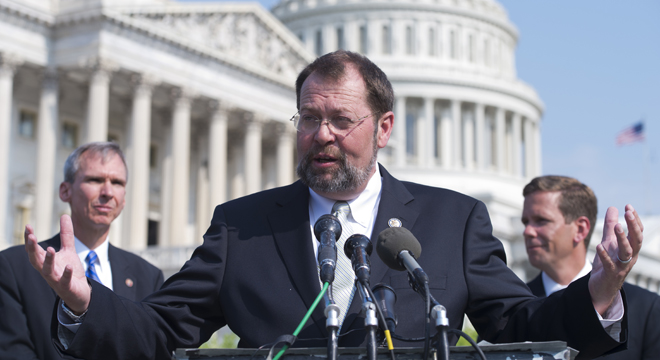In his first national interview since retiring at the end of the 112th Congress, Rep. Steve LaTourette (R-OH) — an outspoken ally of House Speaker John Boehner (R-OH) and a critic of the hardline conservatives driving GOP politics — made light of what’s become of serving in Congress.
“I’ll go back and find something productive to do with my life,” he told The Atlantic. “As opposed to the last 18 years.”
Just three days later he figured it out. And his decision reflects one of Washington’s central and most controversial rites of passage.
LaTourette is combining forces with his lobbyist wife to help an Ohio-based law firm stand up a D.C. lobby shop. It will be called McDonald Hopkins Government Strategies.
LaTourette “will head a new subsidiary of McDonald Hopkins LLC, a business advisory and advocacy law firm with a more than 80-year history and offices in Chicago, Cleveland, Columbus, Detroit, Miami and West Palm Beach,” reads a McDonald Hopkins press release celebrating its influential new influence peddler:
The subsidiary will not be a branch office of the law firm and will not provide legal services, but will operate as an ancillary business, owned by the law firm, and provide lobbying and government relations services in Washington, D.C. LaTourette will serve as President of the newly created McDonald Hopkins Government Strategies with offices overlooking Capitol Hill. The office will provide strategic advice and assistance at the federal government level. LaTourette will team with his wife, Jennifer LaTourette, a Vice President at a major independent lobbying company for the past decade, who will serve as Vice President of McDonald Hopkins Government Strategies.
Before Steve and Jennifer LaTourette were married, she served in his Capitol Hill office as chief of staff. She left in 2003 and became a lobbyist for Van Scoyoc Associates, where she advanced the interests of Ohio-based clients, according to disclosure forms.
That preface is the only unusual part of an otherwise common Washington story — one where former members make big bucks currying favor with their former colleagues, despite ethics rules that supposedly prohibit House members from lobbying for one year after they leave the Hill.
“I am well aware of the limitations on me and I have assured McDonald Hopkins that I will adhere to those limitations,” Latourette said in an emailed statement to TPM. “I have a record of integrity in my 18 years in Congress and that won’t change now.”
In November, the House Ethics Committee, on which LaTourette once served, provided members with a memorandum (.pdf) reminding them that they’re legally forbidden for a time from using their professional connections on Capitol Hill in a variety of post-electoral professions, including lobbying. But the rules are porous enough to allow influential members to find homes at some of DC’s most powerful firms immediately after their last day in office.
“Theoretically he’s banned from lobbying,” says Kathy Kiely, a managing editor at the Sunlight Foundation. “But what this shows you — and you see it all the time — former members go to what are essentially lobbying shops, or go to organizations that have lobbyists, even though they’re not doing the reaching out to their former colleagues, everyone knows who they’re working for, everyone who knows them.”
“These firms are ballyhooing the fact that they have these ex-members on staff,” Kiely adds. “They’re not hired for their beauty. They’re hired because they’re people who are well-connected.”
Spouses benefit from the lax rules too.
“Tom Daschle, when he was Democratic leader of the senate, his wife was a lobbyist — so that’s not unusual [either],” said Kiely. “Nor is it unusual for members to go directly to what are essentially lobbying shops. Tom Daschle is not technically a lobbyist, even though he works for what we call a rainmaker firm.”
Though this practice has given rise to a cottage industry of transparency advocates who closely monitor Washington’s revolving doors, it has become so common that a desensitized political media often doesn’t notice, and so there’s nothing really standing in the way.
“DLA Piper [Daschle’s firm] has spent $13.6 million lobbying Congress,” Kiely says. “It defies credulity that the fact that Tom Daschle works there doesn’t influence his former colleagues [and] it underscores the loopholes in the ban on members of congress doing exactly this.”






